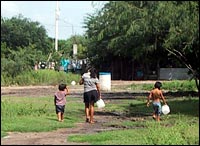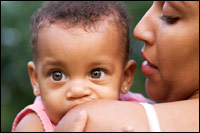population
-
The recipe for twins (sorry, vegans)
Attention female vegans (and no, I'm not soliciting romance, thanks): If you're dreaming of birthing twins, you may want to read this.
Women who eat a vegan diet -- a strict vegetarian diet that excludes all animal products including milk -- are one-fifth as likely as other women to have twins, a U.S. researcher reported on Saturday.
But despite what some headline-writers suggest ("Vegan diet lowers odds of having twins" and "Meat-Eaters More Likely to Have Twins?"), neither meat-eating nor even necessarily veganness seem to be the key.
The reason [for the vegan twin-birth difference] may be hormones given to cattle to boost their milk and meat production, said Dr. Gary Steinman, an obstetrician specializing in multiple-birth pregnancies at Long Island Jewish Medical Center in New Hyde Park, New York.
So if you vegans want to increase the likelihood of twins without disrupting your diet, seems you could maybe skip the dairy and just go right for the growth hormones. Yum.
-
In the world’s slums, the worst of poverty and environmental degradation collide
This article was originally published in OrionOnline. Precarious dwellings in North Sulawasi, Indonesia. Photos: iStockphoto. A villa miseria outside Buenos Aires, Argentina, may have the worst feng shui in the world: it is built in a flood zone over a former lake, a toxic dump, and a cemetery. Then there’s the barrio perched precariously on […]
-
What Mexican activists can teach the U.S. about poverty and the planet
As the border organizer for Sierra Club’s Environmental Justice program, I bounce back and forth across the U.S.-Mexico border supporting grassroots environmental activists. More than the food, language, or currency, the biggest difference from one side to the other is what issues are considered “environmental.” Perhaps nowhere else on earth is there such a long […]
-
An interview with the founder of Worldwatch and Earth Policy Institute
There are few titans remaining in the environmental world — figures that command respect not only inside the movement but in the larger global political milieu as well. Lester Brown is one of them. In 1974, he founded the Worldwatch Institute, one of the first think tanks to focus on the global environmental situation (its […]
-
If you want your kid to be famous.
If you want your kid to be famous, that is.
Demographers (a notoriously "educated guess"-ing bunch) are predicting that the 300 millionth American will be born in October of this year. Do the math ... that's right. You can finish reading this post later.
You're most likely to be the parent of "Baby 300 Million" (or, as I like to call it, B3M) if you are a Latino in Los Angeles County. And it'll be a boy! Congratulations!
Unlike many of his predecessors, B3M could live to be 90. However, jury's out on the kind of world he'll be living in, due to sprawl, etc.: According to one demographer, "By the time the 300 millionth individual gets to adulthood, many of the cities today we consider small and nice to live in won't be so nice." [Ominous music]
Lest you were wondering, Baby 200 Million (who actually probably missed the two million spot by two years, according to later revised Census Bureau estimates, but whatev) is 38-year-old Robert Ken Woo, Jr. of Atlanta. I smell photo op!
In fact, B2M, B3M, and B4M might all be able to hang out, since B4M is scheduled to arrive in, oh, 40 years or so.
-
Is too few people the new “population problem”?
Alston wants your women. All’s quiet on the Alston front. Photo: www.visitcumbria.com. And not just any old hags, either — residents of this northern English town would prefer strapping young things who aren’t afraid to get dirty. “Quite frankly, old people are not going to give us the vitality that we need,” says Vince Peart, […]
-
When it comes to having kids, this global citizen can’t bear it
This old earth has spun ’round the sun 40 times since my founding egg and sperm got cozy with each other, and yet I’m still a solo act: no wife, no family, no tribe. While a life partner and tribe can be left to happen whenever they happen — if they happen — I’m at […]
-
Stats on how far we’ve come (or haven’t) since the first Earth Day
3.7 billion — world population in 19701 6.4 billion — world population in 20051 1,535 billion — kilowatt-hours of electricity used in the U.S. in 19702 3,837 billion — kilowatt-hours of electricity expected to be used in the U.S. in 20053 6.0 — percentage of electricity in U.S. consumed in 1970 produced from renewable sources4 […]



